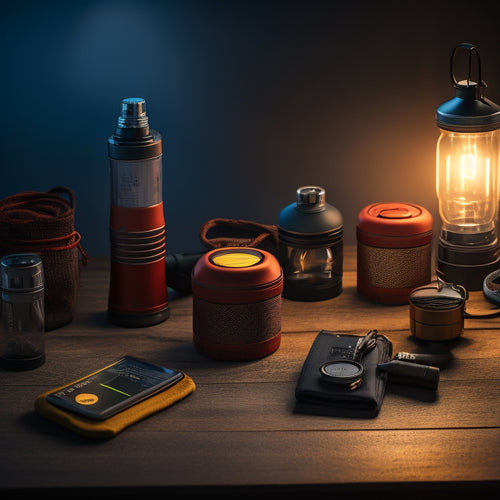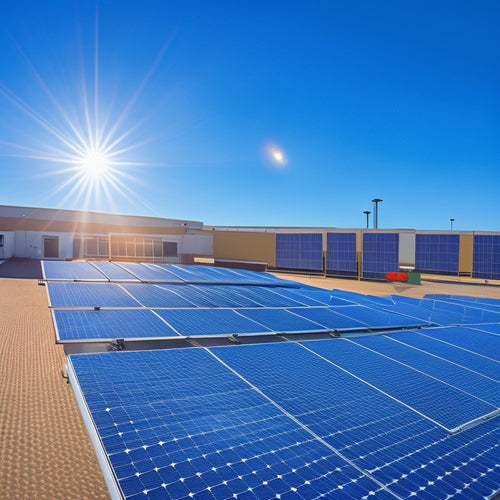
Off Grid Solar System
Share
With an off-grid solar system, you can break free from reliance on the grid and enjoy energy independence, greatly reducing your carbon footprint and energy costs while gaining security and freedom from fluctuating energy rates. You'll eliminate monthly energy bills, leading to predictable, cost-effective energy solutions. To achieve this, you'll need to accurately assess your daily energy usage, select the right battery technology, and optimize your system design for maximum efficiency. By understanding the key components of an off-grid solar system, you'll be well on your way to utilizing renewable energy and accessing a sustainable, self-sufficient lifestyle - and there's more to investigate.
The Essentials
- Off-grid solar systems provide energy independence and sustainability by reducing reliance on traditional energy sources and lowering carbon footprints.
- Transitioning to solar power eliminates monthly energy bills, leading to predictable, cost-effective energy solutions and long-term financial stability.
- Accurate energy demand evaluation is crucial for designing a reliable and efficient off-grid solar system that meets specific energy needs.
- Proper battery selection, maintenance, and care are essential for extending battery lifespan and ensuring overall system efficiency and reliability.
- Maximizing energy production requires optimal solar panel orientation, tilt angle, and advanced technologies like bifacial cells or PERC to harness solar energy effectively.
Energy Independence Matters Most
You're likely considering an off-grid solar system because you want to break free from reliance on the grid.
Having a renewable energy source like solar power guarantees that you're not dependent on external factors for your energy needs.
With an off-grid system, you'll have the power you need without being tied to the grid.
By embracing self-sufficient energy, you'll be able to utilize the power of the sun and reduce your reliance on traditional energy sources.
This not only benefits the environment but also provides a sense of security and independence.
Renewable Energy Source
By going off the grid with a solar system, you're taking a notable step towards reducing your reliance on traditional energy sources and embracing a renewable energy source that's clean, sustainable, and virtually unlimited.
This shift is vital in achieving energy independence, which is essential for freedom. Solar energy is a reliable and abundant resource, making it an ideal choice for off-grid living.
Off-grid solar systems can help solve problems like frequent power outages and rising electricity bills, allowing you to enjoy uninterrupted power supply.
When selecting a solar panel type, consider factors like efficiency, durability, and cost. Monocrystalline and polycrystalline panels are popular options, each with their unique benefits.
You may also want to investigate thin-film solar panels, which are more budget-friendly. Regardless of the type, solar panels will markedly reduce your carbon footprint and energy bills.
To encourage the adoption of renewable energy, governments offer incentives like tax credits, rebates, and net metering programs.
These renewable energy incentives can help offset the initial investment costs of your solar system, making it more accessible and affordable.
Power Without Grid
One of the most significant advantages of an off-grid solar system is the ability to achieve energy independence, which is essential for freedom and self-sufficiency. With an off-grid solar system, you're not reliant on the grid for power. This means you can live where you want, without being tied to traditional energy infrastructure.
You'll have power autonomy, 24/7, no matter where you are. By investing in an off-grid battery bank Renewable Energy Systems, you can store excess energy and guarantee a reliable power supply, even during unpredictable power outages.
Off-grid solar solutions provide a sustainable living option, reducing your environmental impact and energy costs. By utilizing renewable technologies, you can store excess energy in energy storage systems, guaranteeing a reliable power supply.
A well-designed solar installation can provide all the power you need, without the need for grid connection. Plus, with solar financing options available, achieving energy independence is more accessible than ever.
Zero Energy Bills Guaranteed
You can achieve energy independence now with an off-grid solar system, freeing you from reliance on the grid and ensuring you'll never receive an energy bill again.
By utilizing renewable energy and sustainable living practices, you'll reduce your carbon footprint and contribute to a cleaner environment.
By switching to an off-grid solar system, you'll save money monthly, no longer beholden to fluctuating energy rates.
With a guaranteed zero energy bill, you'll enjoy predictable, cost-effective energy independence for years to come.
Energy Independence Now
Achieving energy independence is now a viable option for homeowners, thanks to the rapid advancement of off-grid solar systems. You can now break free from the grid and enjoy the freedom that comes with generating your own clean energy.
With solar innovations, you can store excess energy in advanced energy storage systems, ensuring a steady supply of power even on cloudy days. Embracing an off-grid lifestyle not only reduces your environmental impact but also provides a sense of security and self-sufficiency.
You have the option to take a DIY approach to installation, or you can investigate solar financing options to make the shift more affordable.
With grid alternatives like off-grid solar systems, you're no longer bound to the traditional grid. By adopting sustainable living practices and incorporating energy conservation measures, you can minimize your energy consumption and maximize the benefits of your solar technology.
Save Money Monthly
By utilizing the power of off-grid solar systems, homeowners can now bid farewell to hefty monthly energy bills and hello to considerable savings. With the ability to generate your own clean energy, you'll be saying goodbye to those costly electricity bills and hello to a more budget-friendly lifestyle.
Off-grid solar systems offer a range of cost reduction strategies, allowing you to minimize your energy expenses. By tapping into the power of the sun, you can greatly reduce your reliance on the grid, resulting in substantial savings. Here's a breakdown of the potential cost savings:
| Energy Source | Monthly Cost |
|---|---|
| Grid Electricity | $150-$300 |
| Off-Grid Solar System | $0-$50 |
| Renewable Energy Credits | $50-$100 |
With off-grid solar systems, you can enjoy zero energy bills guaranteed, giving you the financial freedom you deserve. By investing in a budget-friendly option like off-grid solar, you'll be able to allocate your hard-earned money towards the things that matter most to you.
Deep Cycle Battery Life
When you're designing your off-grid solar system, you'll want to take into account the deep cycle battery life, as it's essential to ensuring your system's reliability.
Choosing the right deep cycle batteries for solar power, such as lithium-ion batteries or renewable energy systems, is important for dependable power storage.
You'll need to reflect on the battery's depth of discharge, which greatly impacts its lifespan - a deeper discharge reduces the battery's overall life.
Understanding cycle life expectancy is also important, as it affects how often you'll need to replace your batteries.
Battery Depth Matters
Depth of discharge (DOD) greatly influences the lifespan of your deep cycle battery, making it a critical factor to assess in your off-grid solar system.
You need to take into account the battery type and its suitable DOD to guarantee peak performance and longevity. Flooded batteries, for instance, can handle deeper discharge rates than AGM or Gel batteries. However, even with flooded batteries, it's advised to keep the DOD between 20% to 50% to prolong their lifespan.
Discharge rates also play a significant role in determining your battery's lifespan. You'll want to choose a battery that can handle the required discharge rate of your off-grid solar system.
A higher discharge rate can reduce the battery's lifespan, so it's crucial to select a battery that matches your system's power requirements.
Cycle Life Expectancy
Your off-grid solar system's battery life relies heavily on its cycle life expectancy, which refers to the number of charge and discharge cycles a deep cycle battery can handle before its capacity drops to 80% of its initial rating.
This measurement is critical because it directly affects the overall lifespan of your system. As you use your deep cycle battery, it will naturally degrade over time, reducing its capacity to hold a charge. The cycle life expectancy varies depending on factors such as battery type, depth of discharge (DOD), and operating temperature.
You can extend your battery's lifespan by implementing proper battery maintenance, such as monitoring its state of charge, avoiding extreme temperatures, and keeping it clean.
Additionally, understanding the lifespan factors that affect your battery's cycle life expectancy will help you make informed decisions when selecting the right battery for your off-grid solar system.
Assess Your Energy Demands
You need to calculate your daily energy usage to determine the size of your off-grid solar system.
Start by analyzing your energy expense patterns to identify areas of high consumption, considering the capacity of your renewable energy systems and the efficiency of your lithium-ion batteries(https://www.illchanterl.com).
This will help you pinpoint the appliances and devices that drive your energy demands.
Daily Energy Usage
Evaluating daily energy usage is a vital step in designing an off-grid solar system, as it directly impacts the system's size, cost, and overall performance.
You'll need to assess your energy demands to determine how much solar power you require to meet your needs. Start by identifying the appliances and devices you'll be powering, including lights, refrigerators, computers, and other essential items.
Calculate the wattage and hours of operation for each device to determine your total daily energy usage in watt-hours (Wh).
To reduce your energy demands and optimize your solar power system, consider energy conservation measures such as using energy-efficient appliances, turning off lights and electronics when not in use, and insulating your home.
By minimizing your energy usage, you'll require a smaller solar power system, reducing your upfront costs and increasing your independence from the grid.
Accurate assessment of your daily energy usage is essential to designing a reliable and efficient off-grid solar system that meets your needs and provides the freedom you desire.
Energy Expense Analysis
During the initial stages of designing an off-grid solar system, it's vital to conduct an energy expense analysis to assess your energy demands accurately. This analysis helps you understand your current energy usage patterns and costs, which is essential for determining the size and type of solar system you need.
You'll want to calculate your total energy expenses, including installation expenses, maintenance costs, and utility rates. A cost comparison with your current grid reliance will give you a clear depiction of the long-term savings you can expect from going off-grid.
Financing options and solar incentives can also impact your overall expenses, so be certain to factor those in.
An energy audit can help you identify areas of inefficiency in your current energy usage. By analyzing your energy usage patterns, you can optimize your solar system design to meet your specific needs.
This thorough analysis will guarantee that your off-grid solar system is customized to provide you with the freedom and independence you desire.
Higher Efficiency Solar Panels
You'll want to maximize your off-grid solar system's power output by selecting higher efficiency solar panels.
These panels convert a higher percentage of sunlight into electricity, resulting in more watts per hour.
Max Power Output
Higher efficiency solar panels are the backbone of a max power output off-grid solar system, as they enable you to generate more electricity per unit area. With higher solar panel efficiency, you can maximize your energy production, even with limited roof space or land availability. This means you can power more of your essential appliances and devices, giving you greater freedom and independence from the grid.
To achieve peak performance, it's vital to guarantee your solar panels are installed at the ideal orientation. This typically involves facing them directly at the sun, with a tilt angle that matches your location's latitude. By doing so, you can increase your system's energy production by up to 40%.
Additionally, using high-efficiency solar panels with advanced technologies like bifacial cells or PERC (Passivated Emitter and Rear Cell) can further enhance your system's max power output. By combining these strategies, you can access the full potential of your off-grid solar system and enjoy a more sustainable, self-sufficient lifestyle.
Frequently Asked Questions
Can I Install an Off-Grid Solar System Myself?
You can attempt a DIY installation, but it's vital to weigh the risks: improper connections can be deadly, and faulty wiring can spark fires. Make certain you're well-versed in safety considerations before taking on the challenge.
Are Off-Grid Solar Systems Suitable for Small Homes?
As you imagine waking up in your cozy, secluded retreat, you wonder if small homes like yours can thrive with energy independence. The answer is yes, with off-grid solar systems offering cost efficiency and freedom from the grid.
Can I Add More Solar Panels to My Existing System?
You can expand your existing system by adding more solar panels, but verify compatibility by checking voltage, current, and connector types; also, consider system expansion considerations like inverter capacity and battery bank upgrades to maintain ideal performance.
How Often Should I Clean My Solar Panels?
You should clean your solar panels every 6-12 months, depending on environmental factors, using gentle cleaning techniques to avoid scratching the surface, and prioritize panel maintenance to guarantee maximum energy harvesting and system efficiency.
Can I Use an Off-Grid Solar System for My RV or Boat?
Like a sailor utilizing wind, you can tap into solar power benefits, achieving energy independence on the open road or water. Yes, you can install an off-grid solar system on your RV or boat, breaking free from grid dependence.
Final Thoughts
As you utilize the power of the sun, imagine shackles of energy dependence broken, and the sweet taste of freedom from utility bills. Your off-grid solar system is a guiding light of self-sufficiency, shining bright like a lighthouse in a sea of uncertainty. With deep cycle batteries storing energy for the future, you're safeguarded against the whims of the grid. Your independence is now a reality, and the world is yours to illuminate.
Related Posts
-

Best Solar Powered Flashlights for Emergency Situations
When you're choosing the best solar-powered flashlights for emergency situations, focus on their brightness, battery ...
-

Essential Hiking Lights for Safety and Fun
When you're hitting the trails, essential hiking lights are vital for safety and fun. A lightweight headlamp offers h...
-

Essential Solar Panel Mounts for Commercial Properties
When it comes to essential solar panel mounts for your commercial property, durability and wind resistance are key fa...


